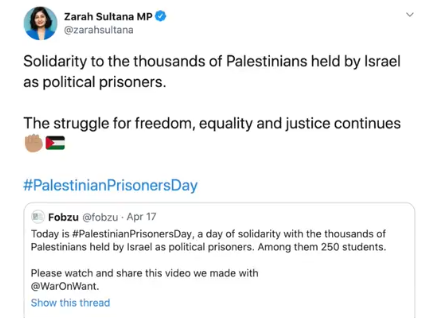This is a cross post by Ben Cohen of Z Word
According to The Scientist magazine, which can be considered an authority on such matters, the Weizmann Institute of Science, located in Rehovot, Israel, comes in at number two on a list of the ten leading international academic institutions working in the life sciences. That ranking will doubtless be received with justifiable glee at the venerable Institute, but I wonder how it will be interpreted at another academic institution which didn’t make the list: the Norwegian University of Science and Technology (NTNU), located in the city of Trondheim.
The NTNU is on my mind because next Thursday, November 12, its Board of Governors will debate whether to adopt a blanket boycott of Israeli academics. In some ways, the current situation is reminiscent of the UCU’s campaign in the UK; according to Ha’aretz, quoting a pro-boycott NTNU academic, “the idea of holding a vote on boycotting Israel was modeled on the campaign run by (guess what’s coming – BC) Sue Blackwell, a leading proponent of an academic boycott of Israel in the United Kingdom.”
And just as the various UCU campaigns dredged up every piece of anti-Zionist rhetoric imaginable, so too does the pro-boycott petition circulating at the NTNU. Here are some highlights (for the full version, venture here and scroll down for the English version:)
Since 1948 the state of Israel has occupied Palestinian land and denied the Palestinians basic human rights…Israeli universities and other institutions of higher education have played a key role in the policy of oppression…Historians and archaeologists are important in the development of the zionist ideology and renouncement of Palestinian history and identity…Hardly any other state has been more often condemned by the UN, but Israel systematically refuses to comply with UN resolutions and international law…we refrain from participating in any kind of academic or cultural cooperation with Israeli institutions and their representatives until guaranties are issued that the occupation of Palestinian land will be terminated.
All that should be very familiar. In sum: Israel is the worst state in the world. Its academics are complicit in its policies of war and occupation. They should be spurned until the occupation is terminated. And since the occupation began in 1948, the boycott will terminate when Israel is terminated.
As news of this initiative has percolated through the internet, an energetic, if diffuse, campaign has been mobilized in response: A number of NTNU academics, led by Professor Bjørn Alsberg, are vocally opposing the boycott; Engage, which did such extraordinary work to counter the UCU boycotters, is on the case; Scholars for Peace in the Middle East has put together an impressive petition signed by several Nobel Laureates; an excellent local blog, “Norway, Israel and the Jews,” is closely monitoring Norwegian press coverage; and individual academics from other universities have been writing to NTNU management and faculty.
One of those academics is Edly Dollar of the Weizmann Institute. Dollar wrote a patiently argued letter to his NTNU colleague, Professor Tore Iversen. He didn’t receive a response, so he copied the letter to Professor Trond Andresen, of the Department of Engineering and Cybernetics at NTNU, one of the academics who signed the pro-boycott petition. Andresen helpfully reproduced Dollar’s letter on his personal page on the NTNU website, together with this note of introduction (translated by a colleague of mine who mercifully speaks Norwegian:)
The Israeli lobby machine sends to my attention a quick and targeted reply.
This is very well organized and swift delivery indeed. I have today, Nov 3, 2009 as a supporter of the NTNU boycott of Israel received a “personal letter”. Notice how it is tailored to me in the sense that the sender positions himself as a “dove of peace” in the Israeli political spectrum.
Smart thinking.
As they might say in Norway, “A-ha!” Those dastardly Zionists are indeed both clever and devious. Their well-oiled machine is shrewd enough to send out personalized letters. Who would have thought?
As I said, Dollar’s letter was patiently argued. He says, inter alia:
The whole notion of “academic boycott” seems to be self contradictory, oxymoronic. In your petition you suggest that “foreign pressure” is the last recourse to persuade Israelis to change the reality for which they are responsible. Not only do I think that it will only corroborate more extremism (and push many moderate Israelis,including Arabs, to leave their country and seek academic jobs elsewhere), I can also think of better ways to help Israelis and Palestinians to achieve peace (yes, I think it is possible). But in addition to all this, I fail to see how academic boycott can be legitimized, academically speaking. Academic activity transcends the national realm. It deals with, thoughts, ideas, scientific exploration and methodological research. A good article is valuable regardless of the national identity of its author.
But Andresen cannot absorb these points because he cannot see past his conception of the “Israel Lobby.” Now, that may have something to do with a series of seminars on the Israeli-Palestinian conflict held at NTNU where one of the speakers was Stephen Walt, co-author with John Mearsheimer of “The Israel Lobby and US Foreign Policy.” But whatever it is that’s influencing Andresen, it’s crystal clear that trying to debate the man is a waste of time. And that’s an observation that can be applied to the vast majority of boycotters.
What more, then, can be done? Some members of the NTNU Board are said to be worried about the consequences of a boycott not on Israelis, but on their own university. They are said to be more amenable to discussion. They include Board Chair Marit Arnstad (marit.arnstad@ntebb.no) and her colleague Beate Reinertsen (beate.reinertsen@ntnu.no). Yet nothing is guaranteed; NIJ reports that “we now know that both Chairwoman Marit Arnstad and Rector Torbjørn Digernes are opposed to the boycott. This does not mean they nays will carry the vote. For that they need the support of five more ‘jurors‘.” There are twelve members of the Board in total.
If the vote does pass, it seems to me that we are facing a situation that is arguably worse than the UCU. The UCU is, after all, a union. It does not control academic institutions, but merely does a bad job of representing some of the people who work in them. By contrast, NTNU is an institution both literally and figuratively, being Norway’s second largest university with 20,000 students. It has the means to directly implement a boycott and, as a participant in various transnational academic networks like the European Commission’s ERASMUS program, it can encourage other universities across the globe to follow suit. A boycott at NTNU will be difficult to dismiss as infantile gesture politics.
That is why, in the event that the NTNU decides that Israel’s universities must be ghettoized and quarantined, it may be time to consider new tactics to counter the academic boycott in the form of a reminder to the boycotting institutions that actions have consequences. As the legal counsel which the UCU received and ignored demonstrated, the academic boycott of Israel is a discriminatory action.
Those who do the discriminating should not assume that the rhythms of their work – student exchanges, inter-faculty conferences, peer-reviewing of academic papers – will continue as normal. But the only people who can shake them out of that assumption – who can say to them, “as long as you discriminate, we will have no dealings with you” – are the leaders of those same universities and programs with whom the NTNU is networked.
Will they step up?
Gene adds: Trondheim, the city where the NTNU is located, is in the county of Sør-Trøndelag. The county council voted in 2005 to boycott Israel.


